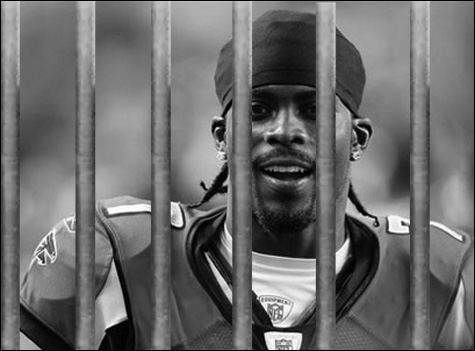
EVERY DOG HAS ITS DAY: Michael Vick may have grabbed the most headlines, but the year's top skell is still Pacman Jones. |
Sad, depressing year in sports crime. Much less funny than usual, was 2007. Normally at this time of year, we’re talking about how many NFL defensive tackles had clouds of spleef smoke spill out of their driver-side windows during “routine traffic stops,” or how many SEC schools let their starting backfields off after they were caught boosting overhead projectors from the university media labs.
Not in 2007. This year the theme was murder and shootings, paralysis and brutal forcible rape. Not since the Rae Carruth era have we seen such grave and disturbing crimes infect the sports world, and probably never before in such quantity: in 2007, we saw murder cases involving a Montana football player (James “Jimmy” Leon Wilson); a onetime NFL running back prospect gone off the rails (Arizona State’s Loren Wade), and a Penn State linebacker (LaVon Chisley).
We saw a case in which a football player committed a carjacking and then shot at highway patrolmen who gave chase; we saw stalking, rape, and gang-style “wilding”; we saw a top baseball prospect sending his wife a menacing picture of a gun on her cell phone (and surviving to get a new start with a new team). Normally we see NFL players busted for solicitation; this year, we saw an NFL linebacker busted for being a pimp.
Even the requisite O.J. Simpson/comic-relief bust, a nearly annual staple of the sports-crime-reporting business, was a pretty serious felony this time around. In short, it was a bad year, a year in which the trivial and humorous tended to be shoved aside by the frankly violent and felonious.
More and more often now, we see crime stories involving currently rostered major college and professional athletes who are involved in no-joke, real-world organized gang activities, whether it’s drug dealing (a Montana State coke-dealing football clique scored a coup when it became the first group of American athletes ever to be described as a cartel), home-invasion robbery (there were reports of football players serially committing armed home invasions in Idaho and Texas), or, in the case of one celebrated pro quarterback, dogfighting.
In that sense, Michael Vick was, on the surface anyway, the athlete perhaps most representative of what was new in sports crime this year: he was a star athlete who had it all but still couldn’t let go of “the life.” In the old days, the poor kid from the Oklahoma white-trash trailer park or the Newport News ghetto who got the big full-ride scholarship saw that as his ticket out. But increasingly, that just isn’t the way it goes anymore. Now the life follows you all the way to the show.
This phenomenon is so common now — and also so charged with racial tension — that sports reporters have learned to write about it in code. Increasingly, in introducing a new star athlete to readers, sports hacks find themselves addressing first and foremost the question of whether said jock has an “entourage.” The widespread use of the latter euphemism was definitely the journalistic innovation of 2007; its meaning was so completely and implicitly understood that, by the end of the year, agents and athletes made the denial of an entourage one of the first orders of business in broadcast and print interviews. “O.J. Mayo says he doesn’t have an entourage,” read a typical story. Then there was the case of former Celtic Sebastian Telfair; a year after Danny Ainge proudly proclaimed that “Sebastian doesn’t have an entourage — that’s just a myth,” Telfair was robbed by an associate of the rapper Fabolous (specifically, “a member of Fabolous’s entourage”). Fabolous himself was shot and wounded in the leg shortly after the alleged robbery.
But the evil king of all sports “entourage” stories was none other than this year’s true master criminal, Adam “Pacman” Jones of the Tennessee Titans. While Michael Vick came across as at least something of a victim in his affair — sent up the river by an NFL leadership perhaps a little too anxious to separate itself from the more grotesque symbols of ghetto culture, even as it welcomed back with open arms takers-of-life like Leonard Little — Jones was something different. Jones was an unrepentant super-engine of glandular indulgence who seemed to have a special talent for two things: returning punts for touchdowns, and getting people shot in strip clubs. He was involved in two shooting incidents in two different clubs: one in Las Vegas (in an incident that popularized for all time the expression “making it rain”) and another, less-publicized affair in Atlanta. The Vegas shooting left three people shot and one, former professional wrestler Tommy Urbanski, paralyzed below the waist. Moreover, Jones was twice arrested for spitting on women. All in all, there were nearly a dozen troublesome incidents involving Jones between his drafting by the Titans in 2005 and his one-season suspension by the NFL this past April. Amusingly, on the night before he was to meet with NFL commissioner Roger Goodell about repealing the suspension, Pacman went . . . to a strip club.